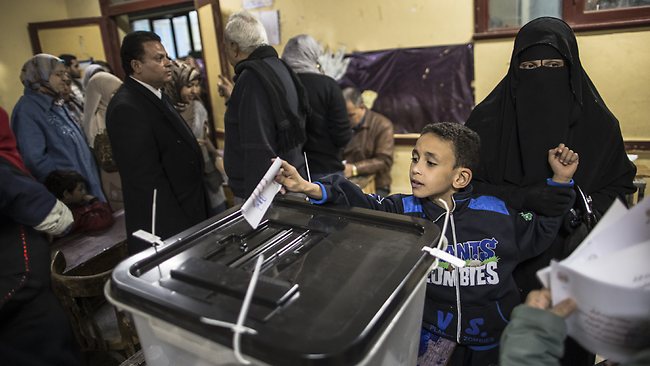
According to unofficial and preliminary results, Egyptians appear to have approved the controversial new constitution in a referendum.
Results reported by Egyptian state media suggest that some 63% backed the charter over two rounds of voting.
Critics say the document, which has triggered mass protests, betrays the revolution that toppled Hosni Mubarak.
President Mohamed Morsi’s mainly Islamist supporters say it will secure democracy and encourage stability.
Official results are not expected until Monday, after appeals are heard. If the constitution passes, parliamentary elections must take place within three months.
Turnout was put at about 30%. The opposition said voting in both rounds of voting had been marred by abuses.
Violations in the second round on Saturday ranged from polling stations opening late to Islamists seeking to influence voters, the opposition said.
On Saturday, ballots were being cast in the 17 provinces that did not vote in the first round on December 15. Some 25 million people were eligible to vote.
The Islamist Muslim Brotherhood movement said early on Sunday that, with most votes counted, more than 70% were in favor.
The opposition National Salvation Front also said the “yes” vote appeared to have won.
In the first round, on December 15, turnout was reported to be just above 30% with unofficial counts suggesting some 56% of those who cast ballots voted in favor of the draft.
Opponents have said the draft constitution fails to protect the freedoms and human rights that they sought in the uprising that ended Hosni Mubarak’s rule last year.
They accuse the president of pushing through a text that favors Islamists and does not sufficiently protect the rights of women or Christians, who make up about 10% of the population.
Egypt’s official state news agency Mena said that at least two judges had been removed for encouraging voters to cast “yes” ballots.

One Egyptian, 19-year-old law student Ahmed Mohammed, said he voted “yes” because Egypt “needs a constitution to be stable”.
But at the same polling station in Giza, south-west of the capital, 50-year-old housewife, Zarifa Abdul Aziz, said: “I will vote <<no>> a thousand times. I am not comfortable with the Brotherhood and all that it is doing.”
As voting took place on Saturday, the country’s Vice-President Mahmoud Mekki announced his resignation.
Mahmoud Mekki, a former judge who was appointed vice-president in August, said the “nature of politics” did not suit his professional background.
Over the past month, seven of President Mohamed Morsi’s 17 top advisers have resigned.
Mahmoud Mekki said he had tried to resign on November 7, but his decision had been delayed by the Israeli conflict in Gaza and President Mohamed Morsi’s controversial decree on November 22 granting himself sweeping new powers.
His resignation statement indicated he had no prior knowledge of the decree, which stripped the judiciary of powers to question the president’s decisions.
After an outcry, the president revoked much of the November 22 decree, but he refused to back down on the draft constitution.
The text was rushed through by a constituent assembly dominated by Islamists and boycotted by liberal and left-wing members, and facing a threat of dissolution by the country’s top court.
Egypt has seen large demonstrations by both sides, which have occasionally turned violent, ever since.
[youtube zTE51Qr689w]